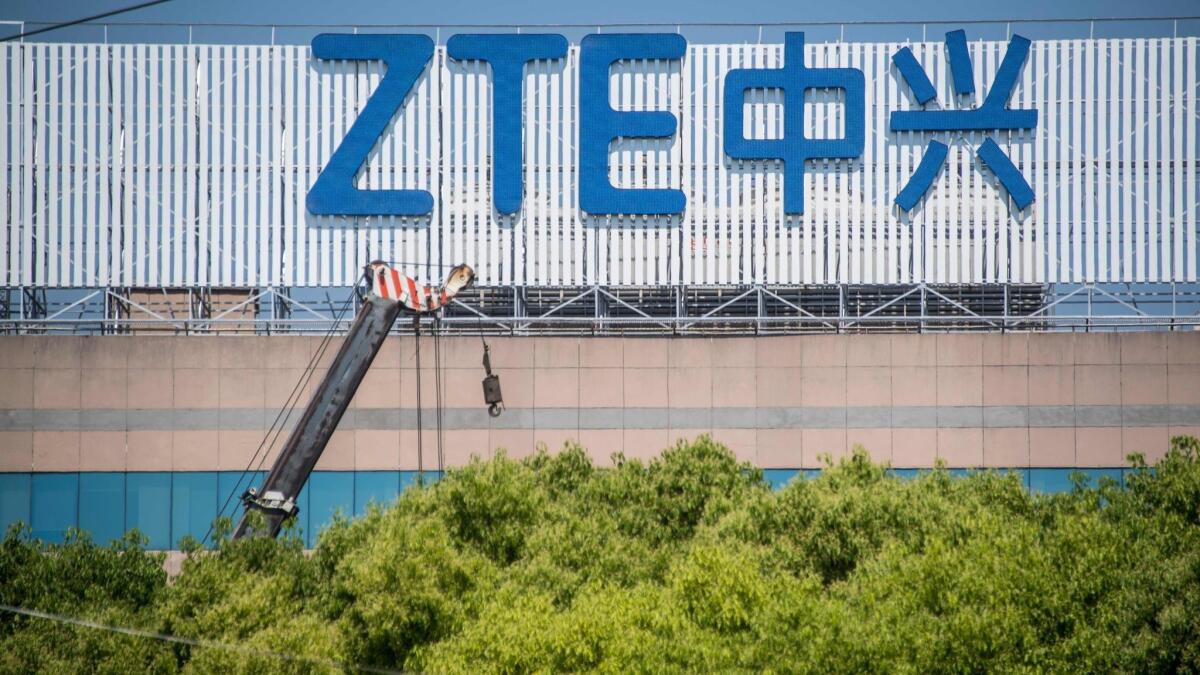Trump administration reaches deal to save Chinese phone maker ZTE despite sanctions, sources say

The Trump administration has informed members of Congress that it has reached an agreement that will allow Chinese telecommunications-equipment maker ZTE Corp. to remain in business, according to two people familiar with the matter.
U.S. Commerce Department officials informed lawmakers that ZTE will pay a bigger fine, hire American compliance officers and shake up its management team, according to the people, who spoke on condition of anonymity. Once ZTE complies, Commerce will lift an order under which the company had been cut off from U.S. suppliers and in effect was unable to stay in business.
The company is the fourth-largest smartphone maker, behind Apple, Samsung and LG. ZTE’s inexpensive Android smartphones have quickly grown in popularity. The company, which also makes telecommunications networking equipment, uses microchips and other parts from U.S. firms such as San Diego-based Qualcomm, Intel and Corning.
A deal on ZTE, which is facing bipartisan objections in Congress, has broad implications beyond the woes of the company. The United States and China are engaged in high-stakes talks on steel, trade and intellectual property rights under the looming threat of punitive tariffs.
U.S. shares of NXP Semiconductors NV closed up 4.7% after the announcement, as signs of better U.S.-China relations bode well for Chinese approval of Qualcomm’s purchase of the Dutch chipmaker. Qualcomm shares closed up 1.5%.
President Trump said he was ordering a reconsideration of penalties against ZTE as a favor to the country’s president, Xi Jinping, after the company estimated losses of at least $3.1 billion from the U.S. technology ban. Trump has said he would “envision” a fine of $1.3 billion.
The plan is already drawing fire from ZTE critics in Congress. “Yes, they have a deal in mind. It is a great deal ... for #ZTE & China,” Sen. Marco Rubio, a Florida Republican, tweeted on Friday.
Senate Minority Leader Chuck Schumer (D-New York) said “both parties in Congress should come together to stop this deal in its tracks.”
The Senate on Thursday released a defense policy bill containing a provision requiring Trump to certify that any ZTE deal with Congress is in the national security interest of the United States.
“ZTE presents a national security threat to the United States — and nothing in this reported deal addresses that fundamental fact,” said Maryland Democratic Sen. Chris Van Hollen. “If President Trump won’t put our security before Chinese jobs, Congress will act on a bipartisan basis to stop him.”
It’s unclear if Congress will be able to muster veto-proof majorities needed to block the president on ZTE, however.
Treasury Secretary Steven T. Mnuchin and Commerce Secretary Wilbur Ross held a meeting with GOP senators on Wednesday laying out the ZTE proposal. Sources briefed on the meeting said lawmakers were told to give the administration room to negotiate the matter and were asked to tone down the public criticism of the deal.
After the briefing, John Cornyn of Texas, the No. 2 Republican in the Senate, expressed support for placing compliance officers at ZTE. “That would be pretty remarkable. Having somebody inside the company to observe what’s going on would be very valuable,” he told reporters.
Senate Foreign Relations Committee Chairman Bob Corker (R-Tenn.) declined to comment on the idea.
On Thursday, the House passed its own defense policy bill with language banning the Pentagon from purchasing ZTE technology.
ZTE ran into trouble in 2016 for violating U.S. laws restricting the sale of American technology to Iran. An agreement in 2017 called for the company to pay as much as $1.2 billion and penalize the workers involved, in what was the largest criminal fine for the Justice Department in an export control or sanctions case.
In April, the Commerce Department said ZTE instead paid full bonuses to employees who engaged in the illegal conduct, failed to issue letters of reprimand and lied about the practices to U.S. authorities. That led to the seven-year ban.
Ross plans to visit Beijing on June 2-4, and China has made saving ZTE one of its priorities. The Trump administration has pushed China to help cut the $376-billion trade surplus with the United States, with Beijing so far making only vague commitments to buy more U.S. goods, including farm products and energy.
But a hasty compromise on ZTE may expose the administration to further criticism in Congress.
“The ZTE move was very surprising,” said Nathan Sheets, chief economist at PGIM Fixed Income and former undersecretary for international affairs at the Treasury Department. “That’s a pretty big concession to the Chinese. If we move down that road, it means we should be getting something back.”
UPDATES:
1:50 p.m.: This article was updated with more background, a comment from Sen. Chuck Schumer (D-New York) and closing stock prices.
This article was originally published at 11:50 a.m.
More to Read
Inside the business of entertainment
The Wide Shot brings you news, analysis and insights on everything from streaming wars to production — and what it all means for the future.
You may occasionally receive promotional content from the Los Angeles Times.










